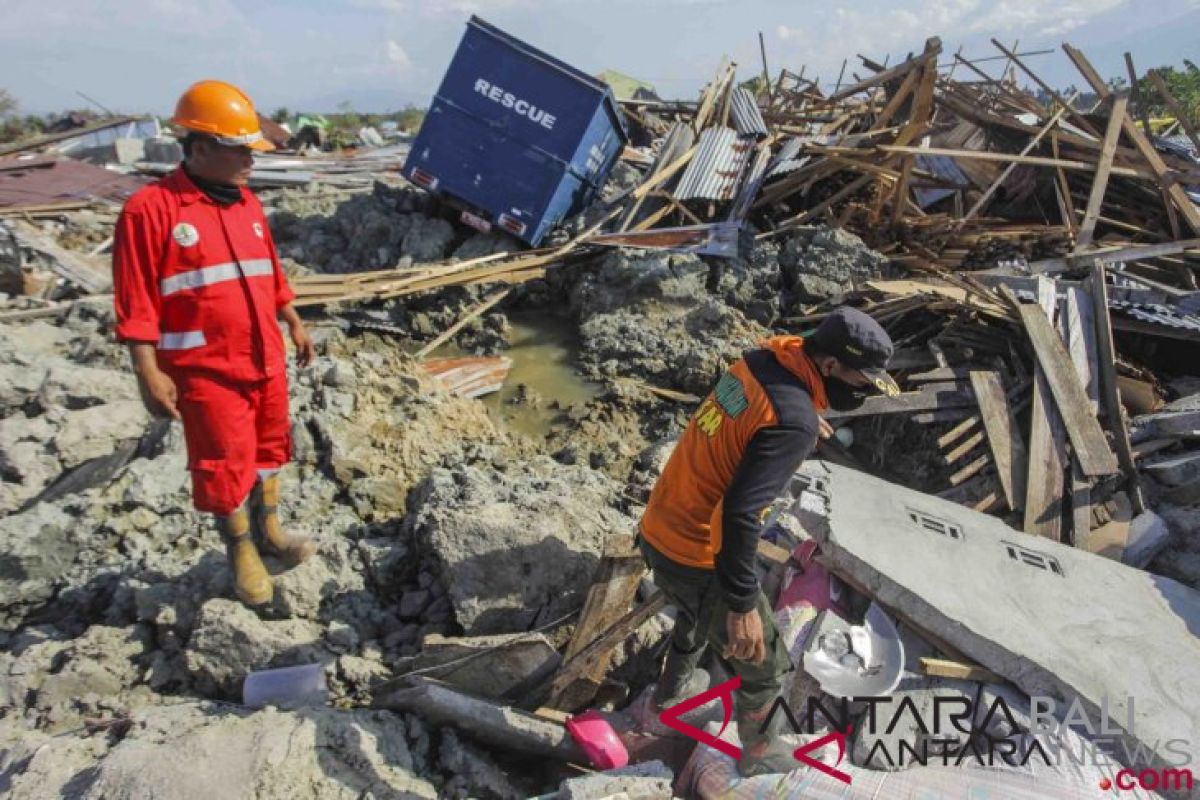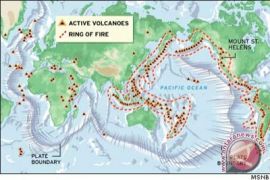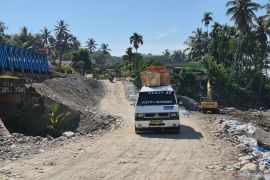The Indonesian people need to find a way to live with natural disasters considering the nation’s geographic location in the Pacific Ring of Fire, a horseshoe-shaped region of converging tectonic plates and several volcanoes.
The World Bank has named Indonesia, the world’s most populous nation, among 35 countries with the highest risk of disasters in the world.
Therefore, the government must continue to scale up precautionary measures to reduce the impact of any potential disaster.
During the January 1-March 1 period this year, Indonesia recorded 657 natural disasters, which claimed 271 lives, rendered 11 missing, displaced 3,421,871 people, and left 12,131 people injured, according to the National Disaster Mitigation Agency (BNPB).
This means that about 10.9 natural disasters occurred daily during the period, up from nine per day during 2020.
This year, Indonesia witnessed 304 floods, 141 whirlwinds, 130 landslides, 12 earthquakes, 58 forest fires, 11 high tides or abrasions, and one drought.
The natural disasters caused damage to 854 educational facilities, 650 places of worship, 182 health facilities, 288 offices, and 88 bridges, and 53,287 homes, of which, 4,816 incurred serious damage, 5,765 suffered moderate damage, and 42,705 experienced light damage.
Most of the natural disasters were recorded in West Java (159), followed by Central Java (110), East Java (88), Aceh (52), West Nusa Tenggara (36), Banten (28), Riau (21), South Kalimantan (16), and West Kalimantan (15). Central Kalimantan, West Sumatra, and North Sulawesi reported 14 disasters each.
The major disasters that struck the nation in January, 2021 were landslides in Sumedang, West Java, on January 9, 2021; a 6.2-magnitude earthquake in West Sulawesi on January 15; and, the massive flooding in South Kalimantan, starting January 12.
Torrential rains and unstable soil caused the series of landslides in Sumedang, claiming 19 lives, leaving 11 others missing, injuring 18 others, and displacing over one thousand local residents. Rescuers were also among the deceased.
In West Sulawesi, the earthquake that struck the districts of Mamuju and Majene on January 15, 2021, claimed at least 105 lives, displaced thousands of people, and destroyed homes, infrastructure, and public facilities.
During 2020, a total of 3,253 natural disasters occurred in the world’s largest archipelagic nation comprising more than 17 thousand islands.
"It means that every day there were at least nine disasters, including earthquakes, tsunamis, volcanic eruptions, forest and land fires, flash floods, landslides, and whirlwinds," BNPB head Doni Monardo said during the opening ceremony of the 2021 National Disaster Management Coordination Meeting on ‘Resilience to Disasters’ at the State Palace, Jakarta, on March 3, 2021.
Related news: Nine disasters reported per day in past year: BNPB
Statistical data on casualties due to disasters shows that around 1,183 people have died in disasters in the last 10 years.
At a recent meeting in Sentul, West Java province, President Joko Widodo (Jokowi) asked all government institutions, including the national army, police, and local governments to work together to carry out prevention, mitigation, and preparedness efforts.
One of the steps that can help reduce the impact of disasters is planning development based on disaster risk reduction, involving experts to predict potential disasters, strengthening early warning systems, preparing contingency plans, and conducting education and training on disasters.
While delivering the opening remarks on the March 3 meeting, the President said that the handling of the COVID-19 pandemic has offered an opportunity to strengthen resilience against disasters in Indonesia.
"We must use this experience as a momentum to strengthen our resilience in mitigating any form of disaster," the President stated.
Earlier, Finance Minister Sri Mulyani Indrawati had said that disasters have led to losses to the tune of Rp28.8 trillion every year.
Related news: Indonesia eyes narrowing down disaster-triggered GDP contraction
The government is targeting to lower the Gross Domestic Product (GDP) decline owing to natural disasters to 0.10 percent, as stipulated in Presidential Regulation Number 18 of 2020 on the National Middle Term Development Plan (RPJMN) for the 2020-2024 period.
To support the target, Coordinating Minister for Maritime Affairs and Investment, Luhut Binsar Pandjaitan, has urged all regions to continue to step up vigil against potential natural disasters, including earthquakes and tsunamis.
"I call upon the governors, district heads, and mayors as well as their subordinates to be heedful of this set target. This is important," the minister remarked.
The government is also seeking to reduce the time taken to issue early warning information on disasters to the public from five minutes in 2019 to three minutes by 2024.
The minister has called upon local authorities to organize disaster risk and mitigation stimulation to support the realization of targets set down in the country's RPJMN for the 2020-2024 period.
Local authorities must not underestimate disaster and climate awareness as infrastructure development would be ineffective in the absence of preparation and awareness of potential disasters, he said.
Local governments must also work in an integrated manner to take requisite precautionary measures and handling natural disasters, he added.
Earlier, the Indonesian Forum for the Environment (Walhi) had urged the government to use the COVID-19-induced multi-dimensional crisis to make a change, particularly in the environmental sector, and treat it as a priority issue.
"The next few months are a crucial momentum for the Indonesian nation," Walhi executive director Nur Hidayati said during the virtual launch of Environmental Review 2021 on February 3, 2021.
The multi-dimensional crisis is related not only to health, social, and economic issues, but also environmental issues, including climate change, she remarked.
She pointed out that hydro-meteorological disasters, such as extreme weather-induced flooding, struck several parts of Indonesia in early 2021. The extreme weather is a concrete impact of climate change caused by the increase in greenhouse gas emissions due to use of fossil fuels and the reduction in forest cover, she said.
Hence, the current situation is an important chance to improve and transform the existing system into an environmentally friendly one, she remarked.
Coordinator of Walhi’s political desk, Khalisa Khalid, also highlighted the significance of green politics and encouraged the endorsement of environmental issues as a priority.
Green politics may offer a solution to the polarization of environmental issues, encourage the adoption of more environmentally friendly policies, and support public interest since the environment has a direct and indirect impact on human life, she noted.
"We hope political awareness at the individual level, which refers to collective political awareness, will be able to turn environmental issues into the main agenda," she said, while expressing her concern because so far, the environment has not been seen as a priority issue. (INE)
Related news: BNPB reports 657 natural disasters hit Indonesia since early 2021
Related news: Pandemic an opportunity to strengthen disaster resilience: Widodo
EDITED BY INE
Editor: Suharto
Copyright © ANTARA 2021












